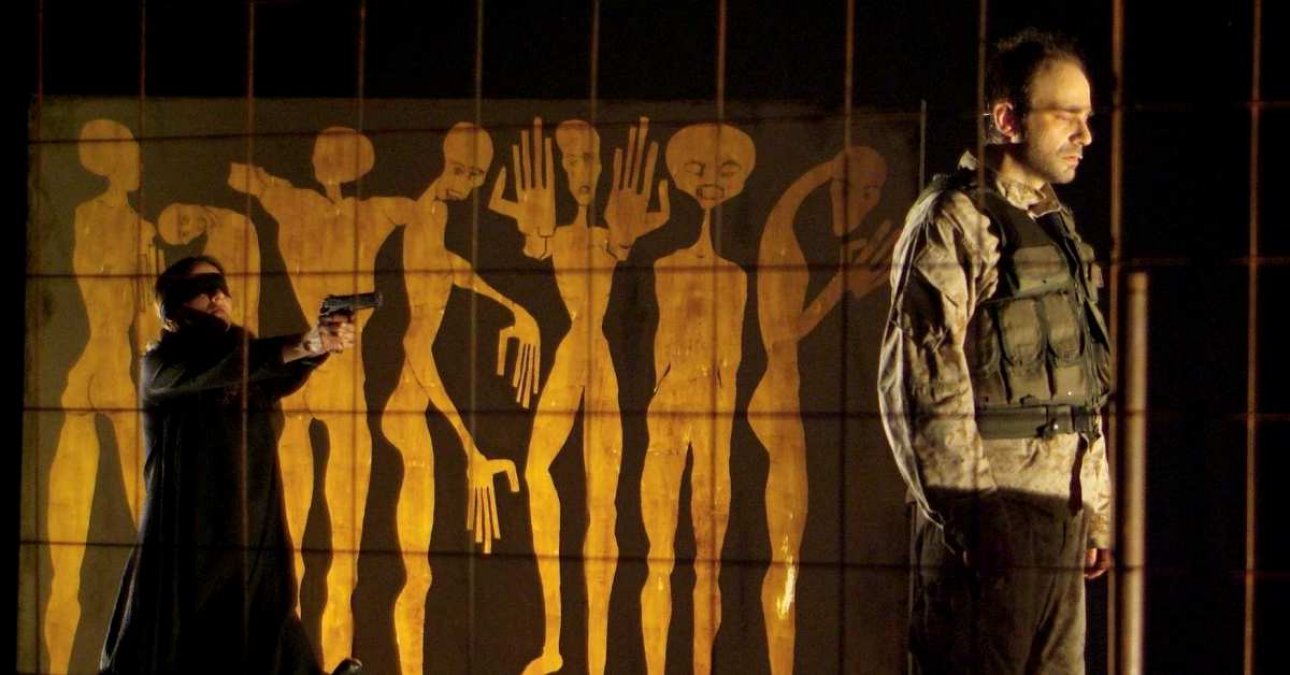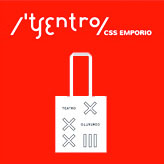Song for Fallujah
Song for Fallujah is an offshoot of the iron will of Simona Torretta, the Italian aid worker who, together with Un Ponte per..., the humanitarian association that employs her, continues to work to help Iraqi refugees in Amman, in Jordan, following the dramatic experience of her kidnap in Baghdad.
CREDITScostumes Cristina Moret
the song Canto per Falluja is composed and arranged by Adriana Vasques
“Un Ponte per...” Association
performance awarded by Premio Enriquez 2009
Canto per Falluja is set in a house in Fallujah, 50 kilometres west of Baghdad, on a night in November 2004. During the siege by the Western coalition forces, an American soldier who is the only survivor of his ambushed division takes shelter in a house in the semi-deserted city and holds an Iraqi woman hostage. Driven by the situation, the two gradually exchange views, memories and opinions on the devastating war, Iraq's recent past, the social reality of an economically depressed America that derives its impetus from the myth of the war against terrorism, Saddam Hussein and the genocide perpetrated using phosphorus bombs.
“Fallujah is a metaphor of war. The war that takes civilians hostage. Entire families were forced to leave their land, home and all their history. Fallujah is not merely a hideout for “terrorists” or “resistance fighters”. It’s also home to people like us, workers, students, teachers, doctors and nurses who approach life with great courage and dignity, despite the many difficulties and dangers with which they must cope. They are anonymous people, without a face, but they share an age-old history.”
Simona Torretta
Canto per Falluja is an offshoot of the iron will of Simona Torretta, the Italian aid worker who, together with Un Ponte per..., the humanitarian association that employs her, continues to work to help Iraqi refugees in Amman, in Jordan, following the dramatic experience of her kidnap in Baghdad.
Simona accompanied Francesco Niccolini and Roberta Biagiarelli (who went on to play the leading female role in the play) among the one-million-strong community to seek out the stories, words, faces and emotions of those with first-hand experience of the terrible siege and occupation of the city of Fallujah, which is also tragically known for having been the target of phosphorus bombs.
After extensive research, Francesco Niccolini wrote a script that differs from a mere public exposure and tells the story of Fallujah through the ill-fated encounter of a US Marine and an Iraqi woman: characters in a contemporary tragedy with echoes of legend and poetry.
The play is set in a house in Fallujah, 50 kilometres west of Baghdad, on a night in November 2004.
The events are so close to us, in time and space, that it seems difficult to find the clarity of mind and distance required to recount them.
The images that haunt us from the newspapers, television and websites recounting the horror of this never-ending war, are so powerful that we can only narrate it and evoke its atrocities in words, just as they could only be told by the messenger in the Greek tragedies.
Eluding the risk of being considered a mere journalistic exposure, this story has two faces, just as it presents two characters and two parts of the world that meet in different points of view of a single tragedy, and the facts are flanked by emotions and poetry.
The contradictions that we witness find no answer, other than the blindness of their protagonists – those on the stage and those who actually caused this umpteenth massacre.
At the time at which Francesco and Simona involved me in this project, I was in Iran, where I was staging José Saramago’s Cecità / Blindness, with Gigi Dall’Aglio and a cast of Iranian actors.
While working on Song for Fallujah I’m often reminded of Saramago’s paradox, in which he recounts a world of blindness – our contemporary world, both East and West – and the faces of the many Iraqi refugees that I met at the visa office in Teheran, devastated but smiling in the hope of finding shelter in the country.
The blindfolded Iraqi woman and the US Marine in Niccolini’s play give us the chance to listen to a terrifying story that unfolds during the course of a long surreal night, in which our hopes and fears collide in a tragic destiny and an impossible dialogue.
Rita Maffei
Francesco Niccolini has been studying, writing and publishing texts and plays for many years, working on drama projects with political, social and historical themes together with important Italian figures and companies, including Marco Paolini, with whom he produced Il Milione, Appunti Foresti and Parlamento Chimico – Storie di Plastica, the television adaptation of Vajont and the Teatro Civico monologues for Report, the television programme broadcasted on RAI 3. He has also written plays for Sandro Lombardi (Via Crucis), Marion d’Amburgo (Grimmm), Massimo Schuster (Mahabharata, Il Grande Racconto Indiano, Roncisvalle!), Antonio Catalano (Papalagi), Enzo Toma and Koreja (Mangiadisk and Paladini di Francia), Roberto Citran (Il Campo della Gloria), Roberto Abbiati (The Clown Shakespeare Company, Il Viaggio di Girafe), Mario Martone, Angela Finocchiaro, Giuseppe Cederna, Roberta Biagiarelli, Alessandro Benvenuti and Banda Osiris.
He has been writing documentaries and screenplays for Televisione Svizzera Italiana since 2007.
His first novel, 1978, jointly written with 15 other authors, will be published in May by Manni. His work has also been published by Einaudi, Garzanti and Titivillus.
Rita Maffei is an actress, director and artistic co-director of the CSS Teatro stabile di innovazione del Friuli Venezia Giulia.
She has written, directed and acted in numerous plays with Fabiano Fantini, including Tracce di un sacrificio, based on the myth of Alcestis and set in an extermination camp.
She has staged many shows in Italy and abroad, preferring contemporary drama (Sony Labou Tansi, Arnold Wesker, Rainer Werner Fassbinder, Alain Cofino Gomez, Jean Cocteau, Sarah Kane) and social and intercultural themes (the Actes/Revoltes project in France and Belgium, and Blindness by José Saramago in Iran, performed in Farsi and directed by Gigi Dall’Aglio).
She won the UNESCO–Aschberg award in 2003 and worked for an extended period in India, presenting The Bacchae at the Vikram Sarabhai International Arts Festival with Indian dancer and actress Mallika Sarabhai, with whom she also produced Western Woman, presented in Italy and on tour in India.
Since 2004 she has also been involved in the production of performances such as Sarah Kane’s 4:48; Tirtha, a show based on Indian and European myths; La Voce Umana, Incroci and Altrove for Vicino/Lontano–Terzani award.
In 2007 she directed the serialised performance Paradiso Perduto with the HC-Capitale Umano group of artists.
Roberta Biagiarelli, actress and playwright, trained at the Laboratorio Teatro Settimo in Turin, the group with which she worked from 1988 to 2001.
In 2002 she founded the Compagnia Babelia & C., dedicating more attention to the aspects of production, research and interpretation of social, historical and political themes.
She has also written and performed the monologues A come Srebrenica, Reportage Chernobyl and Resistenti – Leva Militare '926. On occasion of the tenth anniversary of the Srebrenica genocide (1995–2005), she produced and performed in the documentary film Souvenir Srebrenica (a finalist in the 2007 David di Donatello awards). In 2007 she produced the comedy entitled Incantadora, Cucine e Memorie di una Filibustiera, a divertissement centred on food and portraits of eccentric South American women, and the theatrical reading of Il Poema dei Monti Naviganti, from the book La Leggenda dei Monti Naviganti by Paolo Rumiz. During the same year she produced and starred in the film La Neve di Giugno, recounting the testimonies of partisans adapted from the show Resistenti – Leva Militare '926.
She’s currently engaged in research for the production of a new show entitled Il Tempo della Festa, which depicts festive moments in the Balkans prior to the war.
Images
Texts
programma di sala Canto per Falluja - grafica Gianfranco Casula [898 Kb]locandina Canto per Falluja - grafica Gianfranco Casula [230 Kb]testi del programma di sala Canto per Falluja [128 Kb]cartolina Canto per Falluja - anteprima Udine - grafica Gianfranco Casula [115 Kb]Press reviews
Gianfranco Capitta, Canto per Falluja, una finestra sull'orrore - Il Manifesto, 1 giugno 2008 [100 Kb]Sabrina Zannier, A difesa della vita, oltre la guerra - Messaggero Veneto, 20 maggio 2008 [412 Kb]Roberto Canziani, Il canto per Falluja, città vittina dell'Iraq ha chiuso a Udine Vicino_lontano - Il Piccolo, 20 maggio 2008 [351 Kb]Angela Felice, Dialogo con la morte nella notte di Falluja - Il Gazzettino, 20 maggio 2008 [345 Kb]Tour
premiere
18 May 2008, h 21
vicino / lontano - Premio Terzani
Udine, Auditorium Zanon
tour
11-12 June 2008, h 21.45
da vicino nessuno è normale
Milan, Teatro Cucina, ex Ospedale Psichiatrico Paolo Pini, via Ippocrate 45
14 September 2008, h 21
Fagagna (UD), Castello di Villalta
4 October 2008, h 21.15
Teatri di confine 2008
Pisa, Teatro Lux
14 February 2009, h 21
Sesto Fiorentino (FI), Teatro della Limonaia
13 March 2009, h 21
Teatro Contatto 08-09
Udine, Teatro S. Giorgio
16 March 2009, h 20.45
ContrAZIONI
Monfalcone (GO), Teatro Comunale
23 January 2010, h 21
24 January 2010, h 16
Monza, Teatro Binario 7
from 18 to 20, 23, from 25 to 27 February 2010, h 21
21 and 28 February 2010, h 16
24 February 2010, h 19.30
Milan, Teatro dei Filodrammatici
8 April 2010, h 11
Scampia (NA), Auditorium Scuola Media Statale 'Carlo Levi'




















